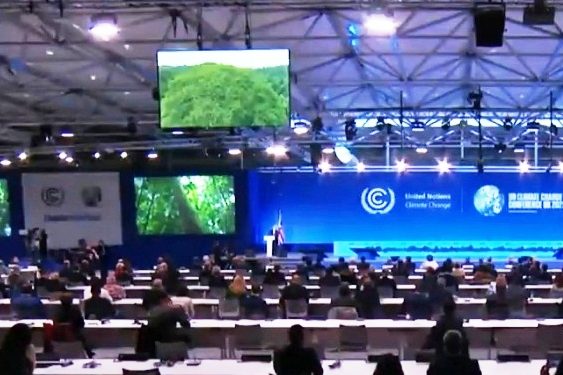Glasgow: Coal is being consigned to history Thursday at the UN climate change summit (COP26), as countries, banks, and organisations move away from the single biggest contributor to climate change.
A just transition to clean energy and the rapid phase-out of coal has been at the heart of the COP26 Presidency as part of its efforts to minimise temperature rises in line with the Paris Agreement.
The breadth of commitments in Glasgow at Energy Day signal the world is moving towards a renewable future.
At least 23 nations made new commitments to phase out coal power, including Indonesia, Vietnam, Poland, South Korea, Egypt, Spain, Nepal, Singapore, Chile, and Ukraine.
In a new ‘Global Coal to Clean Power Transition Statement’, countries also committed to scaling up clean power and ensuring a just transition away from coal.
Thursday’s announcements follow a collapse in the financing of coal, as developed nations have pledged new support to help developing countries make the transition to clean energy.
Banks and financial institutions also made landmark commitments at COP26 to end the funding of unabated coal, including major international lenders like HSBC, Fidelity International, and Ethos.
This follows recent announcements from China, Japan, and South Korea to end overseas coal financing which now means all significant public international financing for coal power has effectively ended.
In addition, a group of 25 countries, including COP26 partners Italy, Canada, the US and Denmark, together with public finance institutions, have signed a UK-led joint statement committing to ending international public support for the unabated fossil fuel energy sector by the end of 2022 and instead prioritising support for the clean energy transition.
Collectively, this could shift an estimated $17.8bn a year in public support out of fossil fuels and into the clean energy transition. Developing countries, including Ethiopia, Fiji, and the Marshall Islands, offered their support, signalling growing unity.
Twenty-eight new members also signed up to the world’s largest alliance on phasing out coal – the Powering Past Coal Alliance, launched and co-chaired by the UK and Canada. New members include Chile and Singapore, joining more than 160 countries, sub-nations, and businesses.
And 20 new countries, including Vietnam, Morocco and Poland, committed to building no new coal plants, matching similar announcements over the past year by Pakistan, Malaysia and the Philippines, and building on the No New Coal Power Compact launched in September by Sri Lanka, Chile, Montenegro and European partners.
There has been a 76 per cent drop in the number of new coal plants planned globally over the last six years since the Paris Agreement was adopted. This equates to the cancellation of more than 1,000GW of new coal plants.
In separate announcements on Thursday, major emerging economies took significant steps to move from coal to clean power. India, Indonesia, the Philippines, and South Africa announced partnerships with the Climate Investment Funds to accelerate their transitions away from coal power, backed by a dedicated $2bn facility.
Indonesia and the Philippines announced pioneering partnerships with the Asian Development Bank to support the early retirement of coal plants.
These followed the ground-breaking $8.5bn deal to support South Africa’s just transition to clean energy announced at the World Leaders Summit on Tuesday.
COP26 President, Alok Sharma, said: “From the start of the UK’s Presidency, we have been clear that COP26 must be the COP that consigns coal to history. With these ambitious commitments we are seeing today, the end of coal power is now within sight.
“Securing a 190-strong coalition to phase out coal power and end support for new coal power plants and the Just Transition Declaration signed today, show a real international commitment to not leave any nation behind.
“Together we can accelerate access to electricity for more than three quarters of a billion people who currently lack access, consigning energy poverty to history as we create the clean power future needed to keep 1.5 alive.”
Responding to decision of 19 countries committing to stop public financing for fossil fuel projects abroad by the end of next year, Jennifer Layke, Global Energy Director, World Resources Institute, told IANS: “It is great to see countries are taking action to shift the world away from fossil fuels toward a clean energy future. The IPCC is crystal clear that to avert a climate disaster our addiction to fossil fuels must end — and phasing out financing is a critical step forward.”
Saying US President Joe Biden must now ensure that the entire federal government is aligned with the important climate-protection initiative, Jake Schmidt, senior strategic director, International Climate in the International Program at NRDC (Natural Resources Defense Council), told IANS: “This will help drive the transition to renewable energy forward to keep 1.5 C alive.”
IANS






































